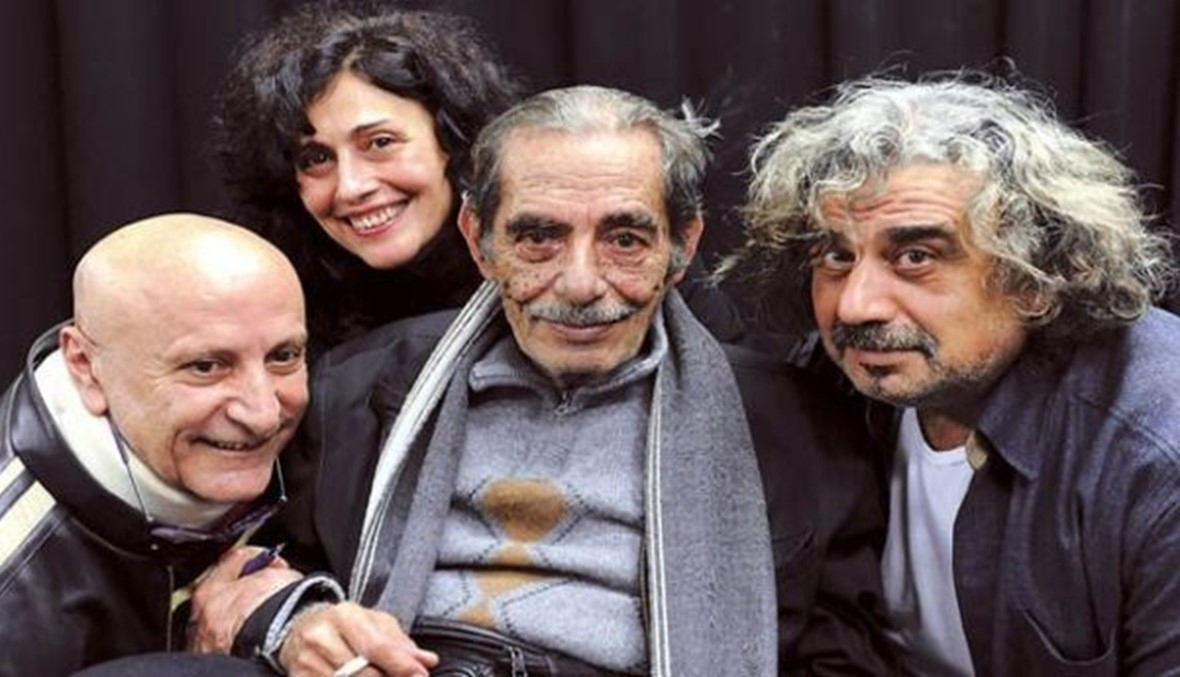A web-based photograph of the late Raymond Jebara with actors Rifaat Tarabay (left), Julia Kassar (above), and Gabriel Yammine (right).
“There are clear faces that do not hide anything, as if their features convey the stories of their owners. It is as if every story in the life of its owner left a mark on it. For the Lebanese playwright Raymond Jebara, he wears a face of fatigue mixed with sharp sarcasm and a smile... eyes that describe the man,” wrote the Kuwaiti Al Jarida in an interview with Jebara in 2010.
The late playwright and director Raymond Jebara (1935-2015) harbored strong feelings about the theater and his craft. Alongside the pioneering theater figures Muneer Abu Debs and Antoine and Latifa Multaqa, Jebara played a prominent role in modernizing Lebanese theater throughout the 1960s and onward. He told Al Jarida in the same interview, "My theater does not end when the curtain falls. I write obsessively, urging the viewer to think after the performance ends. Theater that leaves you thinking about where you will go to eat a plate of cooked beans is not theater.” Whether past or contemporary, readings of his characterization of modern theater may peg him as an elitist. He upheld a straightforward, at times blunt, approach in his life, applying specific standards and sharp opinions to his vision of theater and producing memorable performances as an actor, director, and playwright. Nearly a decade after his death, four directors who once worked as actors with and studied under the late playwright celebrate his legacy through four reproductions of his works from February 28 to April 7 at the Monnot Theater in Beirut this year. The commemorative event was organized by Gabriel Yammine, who has undertaken Jebara’s play “Under Zakour’s Sponsorship” creatively 48 years after he wrote and directed it, a testament to the text's relevance and modernity. The other plays include “Picnic on the Demarcation Lines," “A Sexton Climbing to Heaven,” and "Zarathustra Became a Dog."
Becoming an actor had been a part of Jebara’s dream since childhood, but for much of his youth, it was like a “forbidden love” that he practiced in secret, writes Sawsan al-Abtah in Asharq Awsat. Born on April 1, 1935, in the village of Cornet Chahwan, he studied at the Sisters of the Sacred Hearts school in his village and Al-Hikma School in Achrafieh. He performed his first roles under the direction of the village mayor. At a young age, he contracted malaria and did not recover until he was 15 years old, leading him to leave school before obtaining his secondary school certificate. As an adult, he applied to the military academy but failed the exam, after which his father, a government employee, sent him to live with relatives in Brazil. Shortly after, Jebara reportedly “returned broken as if he had never known the meaning of brokenness before,” returning to Lebanon with a changed outlook on life to “reconsider everything around him and begin a journey with writing that had never been known before,” according to Asharq Awsat.
Excerpted from Elie Chalala's "The Tragicomic Lebanese Reality in Raymond Jebara’s Theater: ‘Sarcastic to the Point of Despair,”’ which appeared in Al Jadid Magazine, Vol. 28, No. 85, 2024 and Inside Al Jadid Reports, No. 78, 2024.
Copyright © 2024 AL JADID MAGAZINE

